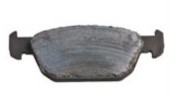How often have you seen or have you ever seen disc brake pads where a the inner pad by the piston(s) was worn out, but the outer pad still look good enough that it would pass inspection?
What I'm getting at here is if you look only at the outer pad thickness that is left, how decent of an indicator is that whether or not the inner pad would probably also be good enough to pass inspection without actually looking at the inner pad?
And one other question, if the slide pins don't slide very well isn't it usually the inner pad that ends up getting worn out quicker?
What I'm getting at here is if you look only at the outer pad thickness that is left, how decent of an indicator is that whether or not the inner pad would probably also be good enough to pass inspection without actually looking at the inner pad?
And one other question, if the slide pins don't slide very well isn't it usually the inner pad that ends up getting worn out quicker?

